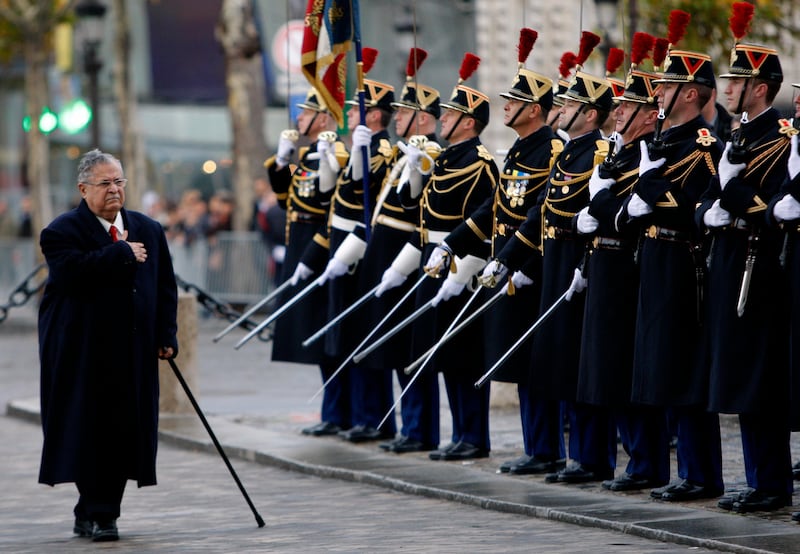“The end of an era”. That is how those who knew Jalal Talabani reacted to his passing. Message after message from officials, diplomats and friends from Iraq and beyond were exchanged on Tuesday afternoon saying the same thing. His death at the age of 83 was “the end of the era”. Few more words were needed.
That he should die as Iraq goes through one of the worst political crises between Baghdad and Erbil adds to the sense of loss that many Iraqis felt with Talabani’s passing.
Several Iraqi politicians, some Kurdish, had said privately that had Talabani been healthy and able to intervene in politics, the current crisis over the Kurdistan Region’s referendum of independence could have been averted.
Talabani had not spoken publicly since 2012, after a severe stroke. And yet he continued to have a presence in Iraqi politics, through the party he founded, the Patriotic Union of Kurdistan and through his wife Hero Ahmed, and two sons, Bafil and Qubad. The PUK supported the referendum held on September 25.
________________
Read more:
[ Former Iraqi president Jalal Talabani dies aged 83 ]
________________
Iraq’s first Kurdish president, Talabani never gave up the dream of an “independent Kurdistan”, yet he was aware that a land-locked Kurdistan could suffer at the hands of its neighbours and for years and warned against moving towards independence.
Talabani had been a strong advocate of working through problems to strengthen Iraq. As president of Iraq from 2005 to 2014, he often spoke of Iraq’s “strength through diversity”. He spoke Arabic with brilliant eloquence, in one sitting reciting classical poetry one moment, and in the next cracking jokes in local Iraqi dialect, often at his own expense, accompanied by a burst of laughter that filled the largest of halls. Kurds, and those who knew him well, called him Mam Jalal, Uncle Jalal.
Talabani had his flaws, as all politicians do. However, his ability to strategise, build alliances for a greater vision and show compassion to those less fortunate, made him one of Iraq’s more formidable characters. He famously refused to sign execution orders, one of his responsibilities as president of Iraq, stating his personal aversion to executions. And yet, it was during his tenure that Saddam Hussein was executed. He was in Paris at the time.
Even when you disagreed with him, you could not help but like him. That was among the many incredible traits of Talabani. A force larger than life, who influenced Kurdish politics for decades and brought rare wisdom to Iraq’s political scene from 2003. At the worst of tensions, Mam Jalal would be able to gather all sides, around a table (usually a dining one) and hammer out a compromise. But he was also stubborn and moody, and all those who knew him knew not to tread too far in antagonising him.
Talabani died less than 24 hours after the news of the death of another one of the founding “presidential council” that ruled Iraq after the 2003 war, Mehdi AlHafez. AlHafez was a former member of Iraq’s Communist party, who later joined forces with secular Iraqi leader Ayad Allawi and served as minister of planning in his government.
As the Kurdistan Regional Government’s current president Masoud Barzani pushes for independence, political parties in Kurdistan and wider Iraq splinter, Turkey and Iran line up to mount pressure on the Kurdistan region, and vast areas of Iraq try to emerge from the wreckage of ISIL, the passing of Talabani reminds Iraqis once again of the “end of an era”.






